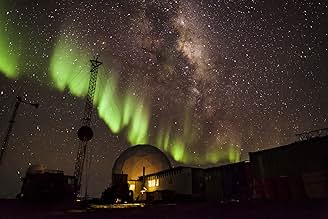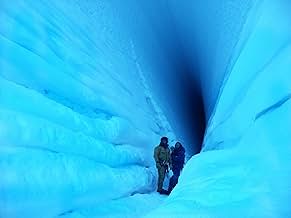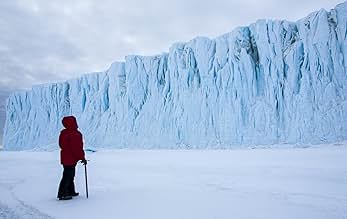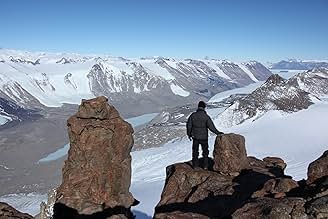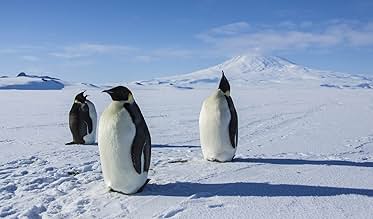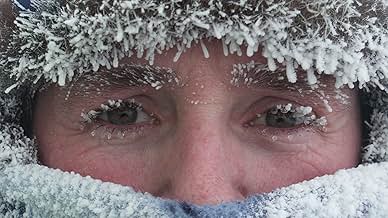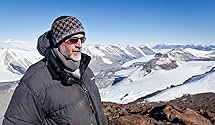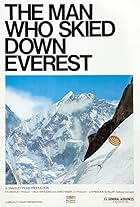IMDb RATING
7.6/10
3.8K
YOUR RATING
A visually stunning chronicle of what it is like to live in Antarctica for a full year, including winters isolated from the rest of the world, and enduring months of darkness in the coldest ... Read allA visually stunning chronicle of what it is like to live in Antarctica for a full year, including winters isolated from the rest of the world, and enduring months of darkness in the coldest place on Earth.A visually stunning chronicle of what it is like to live in Antarctica for a full year, including winters isolated from the rest of the world, and enduring months of darkness in the coldest place on Earth.
- Director
- Writers
- Stars
- Awards
- 17 wins & 3 nominations total
- Director
- Writers
- All cast & crew
- Production, box office & more at IMDbPro
Featured reviews
A documentary made through the lenses of Anthony Powell, photographer who spent many years in Antarctica lead you to the incredible journey to the world we really don't know much. The author describe just a portion of this amazing place over one year of time, combining short interviews, wonderful time lapse photography and just a glimpses of ordinary life of the small population that works on Antarctica. The movie opened many fascinating phenomena, from the mighty storms and winds, cold, 4 months in constant daylight and than darkness and the ways people adapts to those conditions, (T3 Syndrome, for example) which can really be a separate topics for more than one documentary.
Although the movie is not perfect, by my opinion, as it lack some inside to the geography of the place and at least some facts about the conditions there, it basically opened many more questions form me. This movie and its amazing topic with conditions where it was filmed basically don't give you the space to moan about imperfection that surely exists. Instead, it make you wondering about all what is seen, with a feeling that you would like to see much more.
Although the movie is not perfect, by my opinion, as it lack some inside to the geography of the place and at least some facts about the conditions there, it basically opened many more questions form me. This movie and its amazing topic with conditions where it was filmed basically don't give you the space to moan about imperfection that surely exists. Instead, it make you wondering about all what is seen, with a feeling that you would like to see much more.
As it sits, right out of the box, this is a treat.
Documentaries are best when they project the passion of their creator and here we have a gentleman with infinite experience of living on the continent, a gentleman who even took the time and trouble to make his own camera equipment (that would work in the cold) and set out to capture the "experience" for those will never get it first hand.
Which is most of us.
Making heavy use of voice over (as opposed to head and shoulders interviews) this is a fun ride.
I can tell what would have made it perfect.
Since this is fundamentally a story about cold (people yes,landscape yes, but cold mainly) I would have loved to see a digital readout over every shot showing current temperature.
For example, when "summer" ends and the last plane is leaving, I saw people without outerware, dressed casual standing outside. I kept thinking, what was the temperature? In the next shot sequence a winter storm has set in which looks like it could freeze thoughts. What was the temperature then? Just a thought. Good movie. Recommended.
Documentaries are best when they project the passion of their creator and here we have a gentleman with infinite experience of living on the continent, a gentleman who even took the time and trouble to make his own camera equipment (that would work in the cold) and set out to capture the "experience" for those will never get it first hand.
Which is most of us.
Making heavy use of voice over (as opposed to head and shoulders interviews) this is a fun ride.
I can tell what would have made it perfect.
Since this is fundamentally a story about cold (people yes,landscape yes, but cold mainly) I would have loved to see a digital readout over every shot showing current temperature.
For example, when "summer" ends and the last plane is leaving, I saw people without outerware, dressed casual standing outside. I kept thinking, what was the temperature? In the next shot sequence a winter storm has set in which looks like it could freeze thoughts. What was the temperature then? Just a thought. Good movie. Recommended.
Documentaries are definitely not for everyone. It takes a certain patience, curiosity and contemplation to watch the world living its ordinary life, just like it's the case with soap operas or reality shows that try to imitate the real life in vitro. And i consider myself lucky to be able to enjoy the documentaries, since it really is a unique genre that offers some unique experience to a viewer.
Honestly, i didn't expect too much from this film. In my experience with nature documentaries, one has to be both really big and really professional to shoot a truly decent documentary, that is why i absolutely adore the BBC films with David Attenborough, moderately accept the Discovery and National Geographic products and am outright sceptical about everything else. And this movie had that amateur indie feeling that in 99 cases out of 100 means that the outcome is bound to be mediocre.
To my big (and pleasant) surprise, this was that very "1 out of 100" exception. Yes, the movie is basically made by a single man, a time lapse photography enthusiast who spent several years working on a polar base in Antarctica. But the fact that we are being introduced to that vast and secluded icy world by someone who's not a stranger to it himself makes it a different experience entirely. Anthony "Antz" Powell doesn't simply look for some "fancy stuff" to film and later present to us. He actually lives through all these moments, and we are allowed to witness them, which makes this film a rather intimate experience.
It may sound silly, but another great thing about this movie is that it's not just about Antarctica. Though it does share with us the amazing beauty of its pristine nature, it doesn't sell Antarctica as the main and only star. After all, this huge frozen world can be equally beautiful and depressing. Instead, we look at this continent and the life that managed to bind itself to it through the eyes of the fellow workers, people who spent months, or even years, there doing their job and whose impression of Antarctica and the way humans interact with it is the most honest and true.
It's probably not very groundbreaking, but illustrating life in Antarctica with simple people's lives and experiences makes this movie really heartfelt. It is a documentaty, but you invest yourself emotionally into it, you care about the people shown in it, follow their stories, connect to their problems, feelings and dreams. This removes restraints between you and the objects shown in the movie, making you more than just an impassive spectator, almost like a friend to those people. You do not simply consume facts or imagery, as the so-so documentaries offer you to do, you actually live through them.
Maybe i'm fooling myself, but 'Antarctica: A Year on Ice' gave me a bit of a feeling of actually spending a year there. And what it is if not a sign that the film did its job well?
Honestly, i didn't expect too much from this film. In my experience with nature documentaries, one has to be both really big and really professional to shoot a truly decent documentary, that is why i absolutely adore the BBC films with David Attenborough, moderately accept the Discovery and National Geographic products and am outright sceptical about everything else. And this movie had that amateur indie feeling that in 99 cases out of 100 means that the outcome is bound to be mediocre.
To my big (and pleasant) surprise, this was that very "1 out of 100" exception. Yes, the movie is basically made by a single man, a time lapse photography enthusiast who spent several years working on a polar base in Antarctica. But the fact that we are being introduced to that vast and secluded icy world by someone who's not a stranger to it himself makes it a different experience entirely. Anthony "Antz" Powell doesn't simply look for some "fancy stuff" to film and later present to us. He actually lives through all these moments, and we are allowed to witness them, which makes this film a rather intimate experience.
It may sound silly, but another great thing about this movie is that it's not just about Antarctica. Though it does share with us the amazing beauty of its pristine nature, it doesn't sell Antarctica as the main and only star. After all, this huge frozen world can be equally beautiful and depressing. Instead, we look at this continent and the life that managed to bind itself to it through the eyes of the fellow workers, people who spent months, or even years, there doing their job and whose impression of Antarctica and the way humans interact with it is the most honest and true.
It's probably not very groundbreaking, but illustrating life in Antarctica with simple people's lives and experiences makes this movie really heartfelt. It is a documentaty, but you invest yourself emotionally into it, you care about the people shown in it, follow their stories, connect to their problems, feelings and dreams. This removes restraints between you and the objects shown in the movie, making you more than just an impassive spectator, almost like a friend to those people. You do not simply consume facts or imagery, as the so-so documentaries offer you to do, you actually live through them.
Maybe i'm fooling myself, but 'Antarctica: A Year on Ice' gave me a bit of a feeling of actually spending a year there. And what it is if not a sign that the film did its job well?
As someone with a longtime interest in polar exploration, I found this documentary enjoyable but not particularly special. I got halfway through, up to the point where Powell films a young seal, obviously lost and plaintively crying, crawling around by the base in apparent confusion. Presumably it has wandered far off course and is doomed to starve to death. Powell primly informs us that the rules forbid interfering with wildlife, then immediately loses interest and switches to a crew member complaining about the difficulty of keeping up with his family via email.
I don't know the circumstances, and I don't know precisely what small measures might have been taken to aid the stricken animal (offering it some food? Carrying it to the water? Putting it out of its misery?), but when it comes to this sort of decision -- providing some small humanitarian aid versus adhering to some idealized principle of "scientific detachment" (in the midst of a settlement constructed by humans) -- I think his refusal to help is needlessly cruel.
I don't know the circumstances, and I don't know precisely what small measures might have been taken to aid the stricken animal (offering it some food? Carrying it to the water? Putting it out of its misery?), but when it comes to this sort of decision -- providing some small humanitarian aid versus adhering to some idealized principle of "scientific detachment" (in the midst of a settlement constructed by humans) -- I think his refusal to help is needlessly cruel.
Watching Antarctica: A Year on Ice, you'll run out of superlatives to describe the experience. Then you'll start using them all again, in combination, and you'll still be unable to adequately describe what you've seen.
This masterpiece of a film was made by Anthony Powell, a Satellite Communications Technician working out of McMurdo Base, the United States station in Antarctica. It's obvious that the film was born of a deep passion for the place, which he and his wife Christine have returned to, whenever possible, year after year.
How do you share your thoughts about a place which defies description - a place vital to our planet, but which the vast majority will never see? Powell began by taking photographs, recording video, documenting life on the base, the idiosyncrasies of those who work there, and the beauty of the landscape. Over the years, whenever not working on the communications equipment he is responsible for, he's been working on techniques for gathering images in unusual and hostile conditions, often refining or even creating his own gear in order to capture the experience of living in Antarctica for a year.
The result is brilliant; by turns funny, terrifying and heartbreaking - but always awe-inspiring. It's not about the cinematography, (although the photography is frequently top-notch, and some of the time-lapse sequences are stunning,) and other than a few matter-of-fact mentions, nor does Powell delve into political or environmental debate. His purpose here is showing the audience what Antarctica is LIKE: how it feels to work there, what it really looks like, what happens there. His success in this endeavour is as superlative as the film.
See Antartctica: A Year on Ice in the cinema - on the biggest screen you can - and then just wonder at it.
This masterpiece of a film was made by Anthony Powell, a Satellite Communications Technician working out of McMurdo Base, the United States station in Antarctica. It's obvious that the film was born of a deep passion for the place, which he and his wife Christine have returned to, whenever possible, year after year.
How do you share your thoughts about a place which defies description - a place vital to our planet, but which the vast majority will never see? Powell began by taking photographs, recording video, documenting life on the base, the idiosyncrasies of those who work there, and the beauty of the landscape. Over the years, whenever not working on the communications equipment he is responsible for, he's been working on techniques for gathering images in unusual and hostile conditions, often refining or even creating his own gear in order to capture the experience of living in Antarctica for a year.
The result is brilliant; by turns funny, terrifying and heartbreaking - but always awe-inspiring. It's not about the cinematography, (although the photography is frequently top-notch, and some of the time-lapse sequences are stunning,) and other than a few matter-of-fact mentions, nor does Powell delve into political or environmental debate. His purpose here is showing the audience what Antarctica is LIKE: how it feels to work there, what it really looks like, what happens there. His success in this endeavour is as superlative as the film.
See Antartctica: A Year on Ice in the cinema - on the biggest screen you can - and then just wonder at it.
Did you know
- TriviaThe time-lapse sequence in the film of the ice pressure ridges changing shape took 5 months to capture, and lasts about 8 seconds on screen.
- Quotes
Anthony Powell: There's a saying among the women of Antarctica, "The odds are good, but the goods are odd."
- ConnectionsFollows Frozen Planet (2011)
- How long is Antarctica: A Year on Ice?Powered by Alexa
Details
- Release date
- Country of origin
- Official site
- Language
- Also known as
- Antarctica
- Filming locations
- Production company
- See more company credits at IMDbPro
Box office
- Budget
- $1,000,000 (estimated)
- Gross US & Canada
- $288,757
- Opening weekend US & Canada
- $32,238
- Nov 30, 2014
- Gross worldwide
- $288,757
- Runtime1 hour 31 minutes
- Color
- Sound mix
- Aspect ratio
- 1.85 : 1
Contribute to this page
Suggest an edit or add missing content

Top Gap
By what name was Antarctica: A Year on Ice (2013) officially released in Canada in English?
Answer

